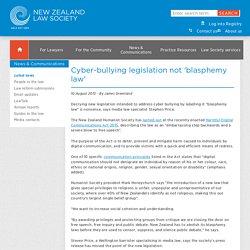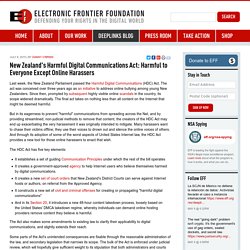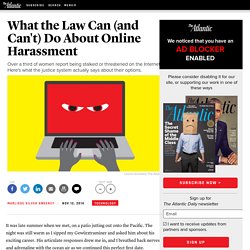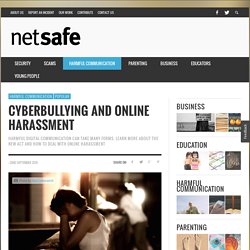

Cyber-bullying legislation not 'blasphemy law' - NZ Law Society. Decrying new legislation intended to address cyber bullying by labelling it "blasphemy law" is nonsense, says media law specialist Stephen Price.

The New Zealand Humanist Society has lashed out at the recently enacted Harmful Digital Communications Act 2015, describing the law as an "embarrassing step backwards and a severe blow to free speech". The purpose of the Act is to deter, prevent and mitigate harm caused to individuals by digital communication, and to provide victims with a quick and efficient means of redress. One of 10 specific communication principles listed in the Act states that "digital communication should not denigrate an individual by reason of his or her colour, race, ethnic or national origins, religion, gender, sexual orientation or disability" (emphasis added).
"We want to increase social cohesion and understanding. "By awarding privileges and protecting groups from critique we are closing the door on free speech, free inquiry and public debate. "They are separate. Frequently asked questions. New Zealand's Harmful Digital Communications Act: Harmful to Everyone Except Online Harassers. Last week, the New Zealand Parliament passed the Harmful Digital Communications (HDC) Act.

The act was conceived over three years ago as an initiative to address online bullying among young New Zealanders. Since then, prompted by subsequent highly visible online scandals in the country, its scope widened dramatically. The final act takes on nothing less than all content on the Internet that might be deemed harmful. But in its eagerness to prevent "harmful" communications from spreading across the Net, and by providing streamlined, non-judicial methods to remove that content, the creators of the HDC Act may end up exacerbating the very harassment it was originally intended to mitigate.
The Progression of New Cyber Laws in New Zealand. Cyber Laws in New Zealand and A Global Epidemic of Internet Crime Cyber bullying is now an epidemic that is reaching every corner of the globe.

Countries worldwide, including the United States are seriously considering passing strict laws that would prosecute cyber bullies who lead their victims to harm themselves or commit suicide. Practice Makes the Perfect Cyber Laws in New Zealand New Zealand is one of many countries who experience serious problems with cyber bullies. This country is concerned about the result of internet bullying that has been leading to a number of suicides and other individuals with reported self-physical harm. The Responsibility of Schools with Cyber Laws in New Zealand. Controversial cyberbullying law passes. • New cyberbullying law will create a criminal offence of intentionally causing harm by posting a digital communication, punishable by up to two years' imprisonment or a maximum fine of $50,000. • Complaints can be made to an approved agency, which will attempt to resolve the issue and may contact companies like Google to get material taken down.

A wide-reaching law that will criminalise online communications deemed deliberately harmful has passed into law - despite unexpected and last minute opposition. The Harmful Digital Communications Bill has passed its third reading, 116 votes in favour to 5 votes against. The controversial law is designed to crack-down on cyber-bullying, but opponents have warned it is too vague and could be used as a weapon against free speech. Act Party leader David Seymour was expected to be the only MP to vote against the legislation, after reluctant support from Labour and the Greens. Continued below. What the Law Can (and Can't) Do About Online Harassment. It was late summer when we met, on a patio jutting out onto the Pacific.

The night was still warm as I sipped my Gewürztraminer and asked him about his exciting career. His articulate responses drew me in, and I breathed back nerves and adrenaline with the ocean air as we continued this perfect first date. Busy professionals, our schedules rarely overlapped so the digital flirtation commenced. It didn’t take him long to ask me to send him a “saucy photo,” (his words) and it didn’t take long for me to tell him that just wasn’t my thing. At least not until the third date, I joked. Days later, Jennifer Lawrence and over 100 other women were exposed across the Internet. Two minutes in, or perhaps when he asked me if I wanted to leave the restaurant and go take a bath together, I realized we were looking for different things. It wasn’t a “let’s fuck.” I was lucky. But what, exactly, is the crime? Take for example the case of Ian Barber in what was New York’s first “revenge porn” case.
Otago085112. NZLC%20MB3. Bullying in NZ Schools. Cyberbullying and Online Harassment - NetSafe: Cybersafety and Security advice for New Zealand. Harmful digital communication can take many forms.

Whether it is an email with offensive content, or a post on a social media site that attempts to spread rumours or lies about an individual, the common theme that runs through these examples is that they are intended to harm someone. While the word “bullying” will often make people think about schoolyard conflict, the problem isn’t limited to young people, but extends to relationships that exist between employers and employees, family members, romantic partners, social groups and tenuously connected acquaintances.
Indeed harmful communication can occur between individuals that seemingly have little connection at all, often referred to as trolling.No matter who the “actors” may be, the end result of bullying and harassment using online tools is usually the same. The Act sets out: